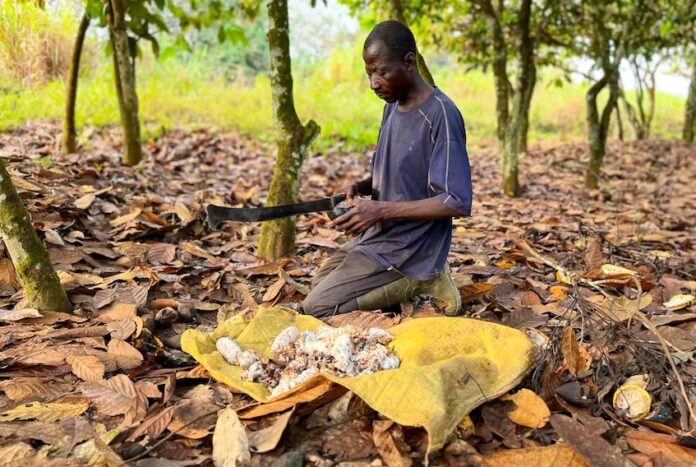SAN PEDRO, Ivory Coast/LONDON, April 4 (Reuters) – Ivorian cocoa bean farmer Edouard Kouame Kouadio expects to die poor, despite rising demand for the raw material that feeds the world’s insatiable appetite for chocolate.
More chocolate than ever is eaten globally, but a flagship programme launched in 2019 that promised a living wage to growers like Kouadio in top cocoa producers Ivory Coast and Ghana has left many worse off, data and interviews with growers, traders and industry experts show.
Kouadio and more than a dozen Ivorian farmers consulted by Reuters said they were paid well below a price set by the government, itself lower than the price promised when the scheme was launched.
“The price set is not respected and we can do nothing with the amount we earn,” said Kouadio, dressed in a faded tee-shirt, as he hacked back weeds on his small plot, just 29 km (18 miles) from San Pedro, the world’s busiest cocoa export port.
Eleven industry experts blamed the situation on surpluses that have kept cocoa cheap globally, as well as on chocolate companies, global commodity buyers and intermediaries in the field seeking to protect margins. They cited inherent flaws in the government programme, including a lack of supply management.
The failure of the living wage scheme to boost or even protect farmer incomes is a blow to global efforts to make the production of chocolate bars more ethically sound after years of promises to purge the industry of child labour, poverty and rampant deforestation.
In the four decades Kouadio has cultivated cocoa, a proliferation of small plantations radically changed Ivory Coast, helping power a fast-growing export economy and almost completely eradicating once-abundant rainforests.
As farmers clear more land, cocoa supply has often outpaced global demand for chocolate, keeping the price for the wrinkled brown beans stubbornly low most years.
Two campaigners and a trader at a large commodity house estimated around a third of Ivory Coast’s cocoa farmers were paid less than the government-set floor price despite the living wage scheme, or “Living Income Differential” (LID).
The LID has also largely failed to achieve a goal agreed with the industry for a minimum $400-a-tonne living-wage premium over global cocoa prices, after global buyers responded by pushing down a separate, “country premium” traditionally paid for West Africa’s high quality cocoa.
Ivory Coast’s cocoa authorities acknowledge that some intermediaries do not pay the “farmgate” price, set by the government twice a year, but did not respond to a request for an estimate of the scale of the problem.



